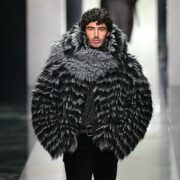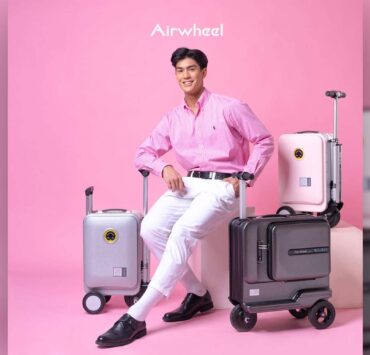Crazy blessings from vintage kimonos

Since 2020, Yumi Christina Sakamoto has been breathing new life into vintage kimonos, transforming them into couture pieces—dresses, blazers, jumpsuits, and more—for the happy clients of her brand Edya1929.
Sakamoto, whose father is Japanese and whose mom is Filipino, moved back to the Philippines from Japan in 2019.
When she created Edya1929, she didn’t set out to create a couture brand. In fact, her first collection was more laid-back resort wear.
“I wanted to make resort wear using kimonos so I can use them here. It’s really a mixed-culture brand—Filipino tropical vibes with kimono fabrics,” Sakamoto told Lifestyle.
But Edya1929 quickly evolved as Sakamoto’s designs became more sophisticated. “Maybe it’s because there’s so much pride and culture in the kimonos. I started to focus on the history and the story of each kimono.”
And so her brand’s identity developed, her two worlds coming together in each creation. “The theme is ‘women who fear nothing,’ she said, showing us beautiful pieces from Edya1929’s archives—garments that seem to command confidence and elegance.
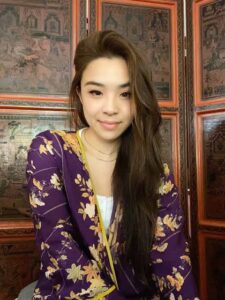
Sakamoto shared, “I’m always searching for the role model of my life, because life itself is too hard…With Edya1929, it’s like I’m creating my own role model, a woman I can follow.”
She loves Edya1929 and intends to keep growing the brand, but there’s a part of her that longs for the kind of designs she used to do. “At Edya1929, my customers are all high-fashion people,” she said. “But I’m not a high-fashion girl.”
In Japan, she worked for Tommy Hilfiger. “They have Tommy Jeans. I was a designer for the Japanese market.”
She also worked for Dickies. “I was a streetwear girl,” she said, laughing.
Sakamoto continued, “I miss resort wear and the street vibe, because that was my background as a fashion designer. I was doing American casual wear, I used to work for a skater brand, I used to dress up skaters.”

Going back to her roots
And so, as a way of going back to her roots in fashion, she decided to launch a new label, a sub-line, called LocaManna. Most of the pieces are still made from vintage kimonos that had been donated, abandoned, discarded, but the pieces under this brand are more casual and easy to wear.
“It’s so different from Edya1929. Edya can be really heavy. LocaManna is more chill and relaxed,” she explained.
That’s where we met Sakamoto—at the launch and pop-up of LocaManna at Guava Sketches in Karrivin Studios last weekend.
“This is my first solo pop-up so I was really scared. But people have been so supportive, and I really appreciate it,” she told Lifestyle.
Guava Sketches was the perfect place for the pop-up. After all, it’s known for curating great indie brands that offer artisanal pieces and focus on craftsmanship and small-batch production.
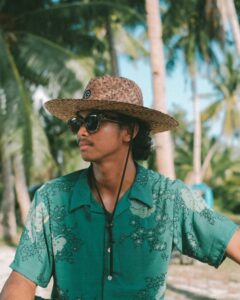
Joan Cantemprate, half of the sister duo who founded Guava Sketches, said, “It was a good reception. It’s so nice. Yumi really chooses the kimonos she repurposes…She likes using 100-percent silk because it’s breathable and mas bagay sa weather here. Each piece has a story behind it and the prices are accessible.”
Sakamoto said, “With this collection you can experience kimono at an affordable price. I want everyone to enjoy wearing kimono.”
LocaManna was also inspired by Sakamoto’s adventures as she explored the Philippines. “I love traveling, going to resorts and tropical places…I met a lot of local people and they inspired me a lot.”
As a tribute, she chose locals to model in the campaign shoot for LocaManna’s debut collection. “They’re not professionals. They’re kids I met in the streets of Siargao. They surf, they skate.”
Sakamoto had no reason to be nervous—LocaManna won over new fans that weekend, a number of them quickly snapping up pieces from the brand.
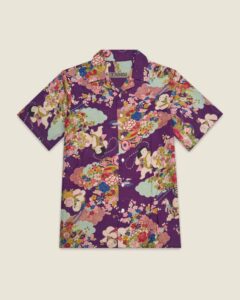
Resort shirts
The resort shirts were very popular. “It’s unisex. It’s a classic aloha shirt design. Since it’s men’s sizing, girls can wear it in multiple ways—as a cover up, you can tie it, there’s a lot of possibilities. They’re all vintage silk. They’re one of a kind. Very loose fit. They’re genderless and very friendly to everyone and the fabric is very breathable.”
There are also short robes, also unisex. “These are haoris, they’re like short kimonos.”
Someone from her team—a six-foot tall guy—was wearing it at the pop-up. Sakamoto said, “On him, it’s short but on girls, it can be a tunic, a cover-up. You can wear it with your bikini. There’s a ribbon so you can tie it.”
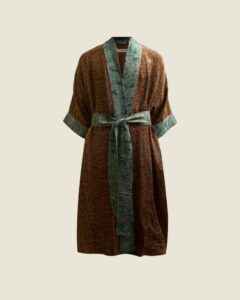
There are full-length robes and pants-and-top sets, also made from vintage kimonos. “These are also loose fit, you can wear them with your bikini, you can wear them to the market, you can also wear them in the city,” said Sakamoto, who had on a set that day.
There are pretty shorts made not of vintage kimonos but of dead stock silk. “The quality of the fabric is amazing. I don’t like using brand new fabrics because it’s not really sustainable. Since it’s dead stock, it’s limited quantity. I cannot make a lot. And I don’t want to make a lot.”
There are enormous bags, too, embroidered with tigers, in vintage satin or abaca.
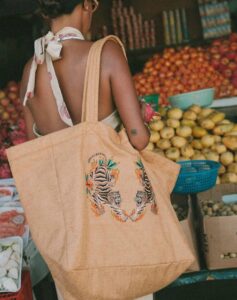
Those who missed the pop-up can shop through Instagram (@locamanna), the website locamanna.store, or by going to Guava Sketches.
Sakamoto also hopes to bring LocaManna to islands and resorts. “Maybe someday, in the near future, you can find them in Siargao, Boracay, or Palawan. That’s my plan.”
She has a lot of plans for LocaManna. “My first collection used kimono fabric. I don’t know what I’m going to use for the next one. I want to find sources when I travel. Maybe I’ll find new material from other countries that I can mix with kimono.”
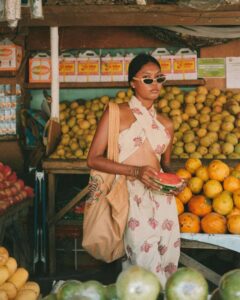
Sakamoto has vintage kimonos of different kinds, colors, and designs waiting to be transformed by her magic so they can be worn again. She showed us an entire box of them and we can’t wait to see what she does with them—whether for Edya1929 or LocaManna.
But wait, why the name LocaManna?
Sakamoto laughed. “I’ve had a lot of crazy experiences here in the Philippines in the fashion industry. But at the end of the day, it’s always nice. It ends up as a nice product. That’s why it’s LocaManna—”loca” is crazy and “manna” is a Biblical word for blessing. The products from LocaManna are a blessing from my crazy experiences.”













